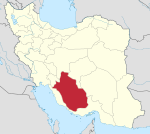Korehi
Korehi
Persian: کرهای | |
|---|---|
City | |
| Coordinates: 30°01′59″N 53°43′04″E / 30.03306°N 53.71778°E[1] | |
| Country | Iran |
| Province | Fars |
| County | Sarchehan |
| District | Central |
| Population (2016)[2] | |
| • Total | 3,954 |
| Time zone | UTC+3:30 (IRST) |
Korehi (Persian: کرهای)[a] is a city in the Central District of Sarchehan County, Fars province, Iran, serving as capital of the county. It was the capital of the district[4] until its capital was transferred to the city of Hesami.[5] As a village, Korehi was the capital of Sarchehan Rural District[6] until its capital was transferred to the village of Siyahun.[5]
Demographics
[edit]Population
[edit]At the time of the 2006 National Census, the city's population was 3,158 in 807 households,[7] when it was capital of the former Sarchehan District of Bavanat County.[8] The following census in 2011 counted 3,912 people in 1,027 households.[9] The 2016 census measured the population of the city as 3,954 people in 1,259 households.[2]
After the census, the district was separated from the county in the establishment of Sarchehan County, and Korehi was transferred to the new Central District as the county's capital.[4]
See also
[edit]Notes
[edit]References
[edit]- ^ OpenStreetMap contributors (9 October 2024). "Korehi, Sarchehan County" (Map). OpenStreetMap (in Persian). Retrieved 9 October 2024.
- ^ a b Census of the Islamic Republic of Iran, 1395 (2016): Fars Province. amar.org.ir (Report) (in Persian). The Statistical Center of Iran. Archived from the original (Excel) on 6 April 2022. Retrieved 19 December 2022.
- ^ Korehi can be found at GEOnet Names Server, at this link, by opening the Advanced Search box, entering "-3072136" in the "Unique Feature Id" form, and clicking on "Search Database".
- ^ a b Jahangiri, Ishaq (c. 2023) [Approved 10 July 2018]. Letter of approval regarding the national divisions of Bavanat County, Fars province. qavanin.ir (Report) (in Persian). Ministry of the Interior, Board of Ministers. Proposal 208742. Archived from the original on 15 September 2023. Retrieved 15 September 2023 – via Laws and Regulations Portal of the Islamic Republic of Iran.
- ^ a b Jahangiri, Ishaq (c. 2023) [Approved 4 February 1400]. National divisions in the Central District of Sarchehan County, Fars province. qavanin.ir (Report) (in Persian). Ministry of the Interior, Council of Ministers. Letter 136331. Archived from the original on 15 September 2023. Retrieved 15 September 2023 – via Laws and Regulations Portal of the Islamic Republic of Iran.
- ^ Mousavi, Mirhossein (c. 2023) [Approved 4 October 1366]. Creation and establishment of 13 rural districts including villages, farms and places in Abadeh under Fars province. lamtakam.com (Report) (in Persian). Ministry of the Interior, Council of Ministers. Proposal 11809.1.5.53. Archived from the original on 7 December 2023. Retrieved 7 December 2023 – via Lam ta Kam.
- ^ Census of the Islamic Republic of Iran, 1385 (2006): Fars Province. amar.org.ir (Report) (in Persian). The Statistical Center of Iran. Archived from the original (Excel) on 20 September 2011. Retrieved 25 September 2022.
- ^ Habibi, Hassan (c. 2022) [Approved 21 July 1374]. Divisional reforms in Fars province. rc.majlis.ir (Report) (in Persian). Ministry of the Interior, Political and Defense Commission of the Government Board. Proposal 1.42.3703; Notification 9116/T14125K. Archived from the original on 21 April 2022. Retrieved 30 September 2024 – via Martyrdom of Imam Ali (AS) Research Center of the Islamic Council.
- ^ Census of the Islamic Republic of Iran, 1390 (2011): Fars Province. irandataportal.syr.edu (Report) (in Persian). The Statistical Center of Iran. Archived from the original (Excel) on 16 January 2023. Retrieved 19 December 2022 – via Iran Data Portal, Syracuse University.


